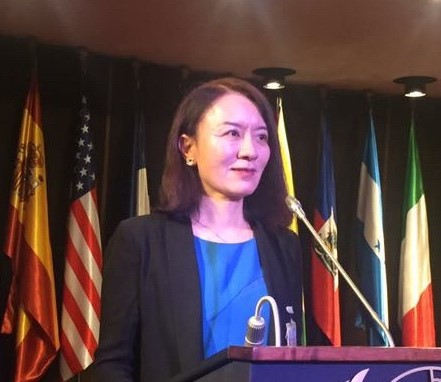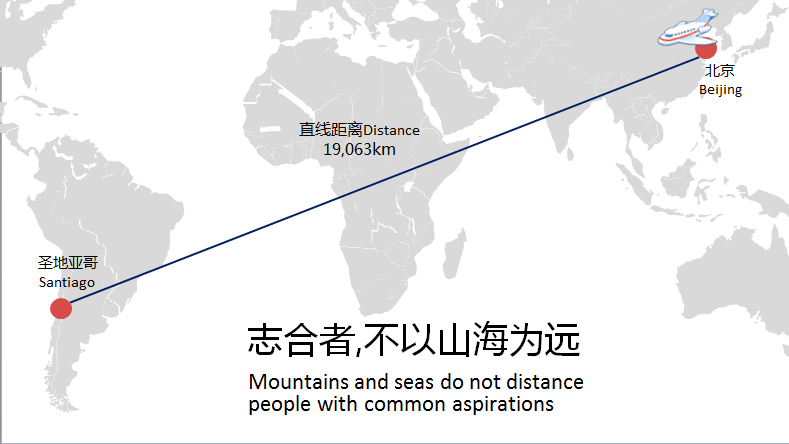


Lu Xinning, deputy editor-in-chief of People's Daily, delivering a speech titled “Expand Mutual Understanding Through Communication and Cooperation” at the first China-Latin America Media Leaders Summit in Santiago, Chile.
As a groundbreaking event in the history of exchange between Chinese and Latin American media, the first China-Latin America Media Leaders Summit opened in Santiago, Chile during President Xi Jinping’s state visit to the country.
Lu Xinning, deputy editor-in-chief of People's Daily, delivered a speech titled “Expand Mutual Understanding Through Communication and Cooperation” at the summit.
Lu said the China-Latin America relationship has achieved a successful “triple boost” by transitioning from a buyer-seller relationship to one of investment partners, and then to development partners. Amid the momentum for increasing bilateral cooperation, we need to increase mutual recognition and understanding among both peoples based on already-existing political, economic, personal and cultural relationships. Media should be in place to assist with this push. Lu also put forward three proposals to enhance exchanges between Chinese and Latin American media.
Below is the full text of the speech:
What connects China and Latin America across the Pacific Ocean?
Bathed in the summer sunshine of the southern hemisphere, we gather here today to attend the first China-Latin America Media Leaders Summit themed “Media Organizations Working Together for Better China-Latin America Cooperation.” Today, we will discuss friendship, share ideas and plan for the future. We are here to contribute our thoughts and make friends. Today is of pioneering significance.
Chile is said to be the farthest country in the world from China. It took us almost 30 hours to arrive in Chile, after plentiful ordeals on the road. On our way here, there was a question that puzzled me: What connects China and Latin America? What pushes us closer to build a future, despite the fact that we are physically divided by the vast Pacific Ocean? I can sense that the answer lies in our common pursuit and strong desire for communication, which resonates with a sentence that President Xi Jinping often quotes: “Mountains and seas do not distance people with common aspirations.”

Though China and Latin American countries are located on opposite sides of the Pacific Ocean, the sea is now more of a bond and bridge between the two parties than a barrier.
Bilateral communication facilitates more platforms
I have been crazy for Latin American literature since I was in college three decades ago. I still remember my admiration when I encountered Latin American literature for the first time. Gabriel Garcia Marquez built the town of Macondo with his imagination; Juan Rulfo depicted the mysterious man Pedro Páramo; Jorge Luis Borges created a magnificent, artistic world; and Pablo Neruda wrote exceptional, emotional poetry. All of this makes me admire the ancient and exuberant Latin American civilization.
Literature brings individuals closer together, while the historical progress after World War Ⅱ, especially more recent changes in the international landscape, encourage both sides to embark on a cooperative course. We must choose a development path, prioritize national rejuvenation and pursue other top-level agenda items. Over the past few decades, China and Latin America have shared a similar attitude toward direct or indirect interruptions from the Western world. Without a doubt, justice and fairness have not been achieved in current international relationships. Given this context, China and Latin America are in great need of mutual support to pursue our own dreams and find a suitable development path.
Bilateral relationship upgraded to development partnership
Today, China-Latin America cooperation has brought practical benefits to our daily lives in all aspects. Some observers pointed out that the China-Latin America relationship has achieved successful “triple boosts” by transitioning from a buyer-seller relationship to one of investment partners, and then to development partners. Amid the momentum for increasing bilateral cooperation, we need to increase mutual recognition and understanding among both peoples, based on already-existing political, economic, personal and cultural relationships. Media should be ready to assist in this ongoing push.
My employer, People’s Daily, is an official newspaper of the Communist Party of China. As a media group with an almost seven-decade-long history, People’s Daily is not only the most influential newspaper in China, it also offers more than 10 media platforms, including magazine, website, television, SMS news and a phone app. The market value of People’s Daily Online, which was successfully listed in 2012, has surpassed that of the New York Times. The number of accumulated downloads of the People’s Daily app has exceeded 148 million. As one of China’s biggest omnimedia organizations, People’s Daily has over 350 million users at home, covering almost one-quarter of the population. In this era, I believe that information flow and voices of the media exert more influence than ever over state-to-state relations and people's welfare.
Talents should be added to build exchange platforms
In order to enhance exchanges between Chinese and Latin American media, I propose that the two sides cooperate in the following fields:
First, an exchange program should be created to replenish the talent pool serving Chinese and Latin American media. At present, the biggest obstacle in bilateral media cooperation is language. Only a few Chinese media outlets can produce original news in Spanish and Portuguese; most of the content is translated. Moreover, there are not enough reporters and editors who are familiar with local life in Latin America. It is similar in Latin America, as few media professionals there can speak Chinese and know about the situation in China.
In the words of Patricia Castro, a Peruvian scholar who lived in China for 12 years, “The best way to know a country is to visit it by yourself. It is hard to let others listen to the voice of China, but as long as we start to communicate, then we are already on the path of mutual understanding.”
In order to enhance mutual understanding, People’s Daily and other Chinese media can send Spanish- and Portuguese-speaking staff to Latin America. At the same time, Latin American media can send their reporters to China, or to learn more about China through local Confucius Institutes.
We can encourage more bilingual talents who speak Spanish, Portuguese and Chinese to provide translation for media, enterprises and governmental organizations on both sides, using a translation crowd-sourcing platform built by Global Times, thus overcoming the language barrier and bridging communication and exchange. We hope such platforms will grow in order to seize more communication opportunities.
Cooperate with think tanks to increase exchange
Second, we should pursue deeper recognition and understanding by cooperating with each other’s think tanks. The Latin America Center of People’s Daily has cemented its relationship with the Getulio Vargas Foundation (FGV), the biggest think tank in Brazil. A prompt communication mechanism, with scholars on topics related to China-Brazil cooperation, was set up as a result. People’s Daily also invited the scholars of FGV to the Forum on "Belt and Road" Media Cooperation, held by People’s Daily in Beijing. Yang Zhenwu, the president of People's Daily, visited Argentina and Brazil last year, during which time he communicated with local media, gave a speech at FGV, introduced China’s economic “new normal” and answered questions raised by local scholars and media representatives. Similar events for communication should be held more frequently in the future. In fact, we could and should apply this exchange method to other Latin American countries, or even copy it in Latin America research institutes in China. People's Daily is willing to establish a platform for more discussions in order to enhance mutual understanding.
Content cooperation should be bolstered
Third, we should provide readers with more news by increasing our content cooperation. Currently, a considerable portion of Chinese reports on Latin America are cited from Western media, and the situation in Latin America is the same. There are only eight reporters from five Latin American media organizations in China. Though Chinese media have stepped up their efforts in covering Latin American events, their counterparts in Latin America haven’t given enough focus to Chinese mainstream reports. Instead, they tend to use content from the Associated Press and EFE.
I want to let all my colleagues know that People’s Daily is China’s biggest omnimedia group and most important news content producer. We provide a customized news service to foreign media, offering them China-related news based on their demands. Some media from Latin America and other parts of the world have shown interest in this service. We welcome more Latin American media to try our service, and your suggestions and advice are most appreciated. We invite all of you to read the China-related news provided by the Spanish and Portuguese channels of People’s Daily Online. The website can act as a news exchange mechanism with major online media in Latin America in the future. Meanwhile, we are considering presenting quality reports written by our Latin American counterparts on our platform, so as to give the two peoples a window to know each other through content cooperation.
Dear colleagues,
There is an old saying in China, “To know is to understand and sympathize.” This era has given the media a mission to tighten ties between China and Latin America. In July 2014, President Xi Jinping brought up the idea that the Chinese dream and Latin American dream are one and the same. During this trip, President Xi’s second visit to Latin America, he explained the important initiative of building a China-Latin America community of common destiny. The people of our two sides have been bravely pursuing and realizing dreams on the foundation of our ancient civilizations. These practical actions are extraordinary stories that we must record and tell. I hope all media professionals will strive hard to tell more impressive stories about China-Latin America cooperation.
Thank you!
(By Yan Huan, Hou Lulu from People’s Daily)

 Who Will Fit The Chinese Roles In Game Of Thrones?
Who Will Fit The Chinese Roles In Game Of Thrones? China's Hubei Shennongjia added to World Heritage List
China's Hubei Shennongjia added to World Heritage List Cute Dog At Fruit Stand Becomes Latest Internet Sensation
Cute Dog At Fruit Stand Becomes Latest Internet Sensation Top 10 livable Chinese cities
Top 10 livable Chinese cities The last primitive tribe in China
The last primitive tribe in China China's first intelligent security robot debuts in Chongqing
China's first intelligent security robot debuts in Chongqing A Total of 3,552 Subscribers Vanish In Two Days; YouTube Closes All Doors to Users’ Inquiries
A Total of 3,552 Subscribers Vanish In Two Days; YouTube Closes All Doors to Users’ Inquiries Out of this world! Futuristic UFO-shaped yacht has its own garden and a stunning underwater viewing deck
Out of this world! Futuristic UFO-shaped yacht has its own garden and a stunning underwater viewing deck An old tea house in Chengdu
An old tea house in Chengdu Furious Customer Crushes All the Buns from Vendor Just Because He Was Given the Wrong Flavor
Furious Customer Crushes All the Buns from Vendor Just Because He Was Given the Wrong Flavor